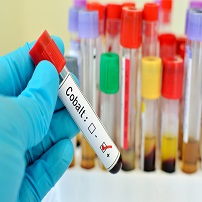
Hip replacements are a very common procedure that has undergone some recent advancements in durability of design. The hip is a ball-and-socket joint and for a long time, the standard for a hip replacement was a metal ball in a plastic socket. However, metal sockets have become common as they help make the artificial hip more durable and last longer. Unfortunately, there are some potential negative effects and some very real dangers caused by the fully metal ball-and-socket joint.
Cobalt is a tough metal frequently used in artificial hip joints. With metal-on-metal hip implants, the metal ball and metal socket slide against each other during physical activity. This causes tiny particles, referred to as “ions”, to scrape off and enter the body. This can cause painful and potentially dangerous reactions in the body. While cobalt ions often stay localized and only cause issues around the hip, there is a risk that they will enter the bloodstream and cause problems throughout the body. This can cause many health problems, including heart disease, kidney failure, and certain kinds of cancer.
A large part of the danger of cobalt toxicity is that the symptoms can be difficult to detect. Symptoms of localized cobalt toxicity include:
The symptoms of non-localized cobalt toxicity include:
The first line of treatment for cobalt toxicity is to remove the metal implant. If the patient’s kidneys are functioning properly, cobalt levels in the bloodstream should decrease rapidly. However, ongoing treatment is frequently required, and is sometimes necessary for the rest of a patient’s life. Those who have received a metal-on-metal hit implant should stay alert to the potential symptoms of cobalt toxicity. The sooner that it is diagnosed, the better potential there is for a quick and healthy recovery.
If you or a loved one is suffering from cobalt toxicity or similar issues related to a defective medical device, you may be entitled to compensation. The Philadelphia defective medical device lawyers at Brookman, Rosenberg, Brown & Sandler are prepared to fight for you. Call our Philadelphia office at 800-369-0899 or contact us online to arrange a free confidential consultation. We assist clients throughout the area, including those in Philadelphia County, Chester County, Delaware County and New Jersey.